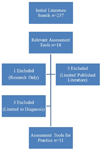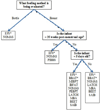Assessment Tools for Evaluation of Oral Feeding in Infants Younger Than 6 Months
- PMID: 26945280
- PMCID: PMC4781663
- DOI: 10.1097/ANC.0000000000000255
Assessment Tools for Evaluation of Oral Feeding in Infants Younger Than 6 Months
Abstract
Background: Feeding difficulty is common in infants younger than 6 months. Identification of infants in need of specialized treatment is critical to ensure appropriate nutrition and feeding skill development. Valid and reliable assessment tools help clinicians objectively evaluate feeding.
Purpose: To identify and evaluate assessment tools available for clinical assessment of bottle- and breastfeeding in infants younger than 6 months.
Methods/search strategy: CINAHL, HaPI, PubMed, and Web of Science were searched for "infant feeding" and "assessment tool." The literature (n = 237) was reviewed for relevant assessment tools. A secondary search was conducted in CINAHL and PubMed for additional literature on identified tools.
Findings/results: Eighteen assessment tools met inclusion criteria. Of these, 7 were excluded because of limited available literature or because they were intended for use with a specific diagnosis or in research only. There are 11 assessment tools available for clinical practice. Only 2 of these were intended for bottle-feeding. All 11 indicated that they were appropriate for use with breastfeeding. None of the available tools have adequate psychometric development and testing.
Implications for practice: All of the tools should be used with caution. The Early Feeding Skills Assessment and Bristol Breastfeeding Assessment Tool had the most supportive psychometric development and testing.
Implications for research: Feeding assessment tools need to be developed and tested to guide optimal clinical care of infants from birth through 6 months. A tool that assesses both bottle- and breastfeeding would allow for consistent assessment across feeding methods.
Conflict of interest statement
Conflicts of Interest and Source of Funding: There is no conflict of interest.
Figures
References
-
- Rommel N, De Meyer AM, Feenstra L, Veereman-Wauters G. The complexity of feeding problems in 700 infants and young children presenting to a tertiary care institution. J Pediatr Gastroenterol Nutr. 2003 Jul;37(1):75–84. - PubMed
-
- Perrin JM, Anderson LE, Van Cleave J. The rise in chronic conditions among infants, children, and youth can be met with continued health system innovations. Health Affairs. 2014 Dec;33(12):2099–2105. - PubMed
-
- Thoyre SM. Feeding outcomes of extremely premature infants after neonatal care. JOGNN. 2007 Jul-Aug;36(4):366–375. - PubMed
-
- Lindberg L, Ostberg M, Isacson IM, Dannaeus M. Feeding disorders related to nutrition. Acta Paediatr. 2006 Apr;95(4):425–429. - PubMed
Publication types
MeSH terms
Grants and funding
LinkOut - more resources
Full Text Sources
Other Literature Sources
Medical
Miscellaneous



